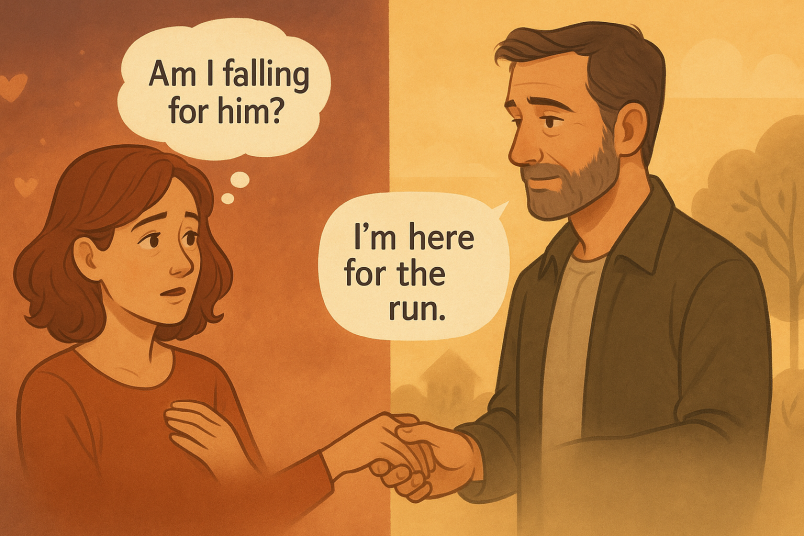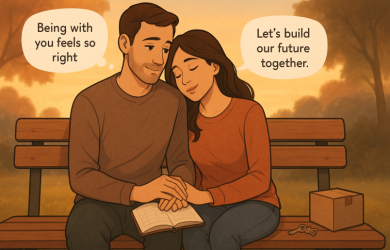Infatuation vs Love: Key Differences You Must Know

Heal & Grow Daily for a Happier Relationship
Subscribe FREEKey Takeaways
Marriage.com AI Quick Summary
It’s easy to get swept away by a racing heartbeat, butterflies that just won’t quit, and that constant urge to replay every little moment in your head… but feelings can be tricky!
Sometimes what feels like forever might just be a spark, while other times that quiet comfort holds more meaning than fireworks.
The tug-of-war between intensity and steadiness can leave anyone wondering if it’s really passion or something deeper. Infatuation vs Love often blurs into one big wave of emotions; yet noticing the subtle shifts—like ease in silence, patience in flaws, or excitement that doesn’t fade—can reveal so much.
What is infatuation vs love
Infatuation is that whirlwind of intense attraction—it’s exciting, consuming, and often focused on how someone makes you feel in the moment. Love, on the other hand, grows steadier over time; it’s about trust, patience, and truly accepting another person, even when things aren’t perfect.
Example: You might feel infatuated when you can’t stop thinking about someone you just met, replaying their texts and waiting for the next high. Love shows itself later—like when you’ve been with someone long enough to sit through tough days together, yet still choose each other with kindness.
Please note:
It’s normal to feel confused in the space of infatuation vs love. Both play important roles in human connection, and neither means you’re “wrong” for feeling the way you do. It’s all part of learning about yourself and your relationships.
How to identify infatuation vs love?
Ever wondered what the difference is between infatuation and love when your emotions feel like a rollercoaster? One moment it’s sparks and obsession, the next it’s calm and steady. These signs can help you tell the difference with ease.
-
7 signs of infatuation
Sorting through your emotions can feel overwhelming—one moment it’s butterflies and late-night daydreams, the next it’s calm trust and deep comfort.
Dr. Jenni Schulz highlights that:
Infatuation is linked to feel-good chemicals like dopamine, which flow in our bodies when we develop feelings of lust or strong physical attraction toward a romantic interest.
A research paper published in 2013 states that valuing friendship in non-marital romantic relationships predicts greater love, sexual satisfaction, and commitment — and it reduces chances of breakups over time.
That’s where the puzzle of infatuation vs love comes in. Wondering how to tell love vs infatuation? These signs can help you notice the difference with clarity and care.
1. You think about this person all the time
The moment you wake up, and before you sleep, you think about this person. You might even stalk their social media accounts.
- Example: You catch yourself refreshing their Instagram feed multiple times a day.
2. You have strong feelings, yet you haven’t spent time with this person
It’s possible to be super infatuated with someone even if you have spent little time with them. You can’t even understand it, but you’re head-over-heels attracted to a person you just see in the hallway.
- Example: You feel butterflies just passing them at work, even though you’ve never had a real conversation.
3. Your feelings are close to obsession
Have you ever felt like you’re addicted to love?
A research paper published in 2023 states that people with preoccupied or fearful adult attachment styles tend to experience love addiction, and that low self-esteem fully mediates this relationship, linking insecure attachment to unhealthy romantic dependence.
That might not be love at all, but infatuation.
- Example: You check your phone constantly, waiting for their name to pop up in a notification.
4. All you think about is how you can impress this person
Here’s another infatuation vs. love sign. It’s an infatuation if your goal is to get your special someone’s attention and impress this person.
- Example: You spend hours planning the perfect text just so they’ll notice you.
5. Your judgment is clouded
People are asking you to get to know this person better. They want you to take time and think hard, but your judgment is clouded. This is a sign that you’re infatuated and not in love.
- Example: Friends tell you to slow down, but you dismiss their concerns because your feelings feel “too real.”
6. You ignore red flags
You hear comments about this person’s not-so-good traits. Maybe you’ve even seen it yourself. What if you started going out and you see those red flags? Infatuation can cause a person to ignore even the red flags they are seeing.
- Example: You excuse rude behavior by saying, “They’re just having a bad day.”
7. Your attraction only focuses on appearance
Love vs. infatuation differs in how you see the person. With infatuation, most of the time, people are only focused on what they see, since they don’t know that person really well.
- Example: You gush over their looks but can’t describe how they make you feel safe or understood.
-
7 signs of love
When feelings deepen, they often look calmer but more meaningful.
According to Jennifer Jacobsen Schulz, LCSW:
Love also requires intentional action; you must make an effort to maintain your love.
If you’ve been wondering how do you know if you love someone vs infatuation, here are gentle signs that point toward love—the kind that grows through trust, patience, and acceptance.
1. You feel safe being yourself
Love shows up as comfort—you don’t have to pretend or impress.
- Example: You can share your quirks, like singing off-key, and still feel accepted.
2. You care about their happiness
It’s not just about how they make you feel; you want them to thrive, too.
- Example: You’re genuinely happy when they succeed, even if it outshines you.
3. You can handle tough days together
Love holds steady when things aren’t perfect; it doesn’t vanish with conflict.
- Example: After a disagreement, you both work things out calmly instead of walking away.
4. You accept their flaws
Unlike infatuation, love means seeing imperfections and still choosing them.
- Example: You know they’re forgetful with chores, but it doesn’t shake your bond.
5. You feel a long-term connection
Love looks beyond the moment—it imagines a shared future, not just instant thrills.
- Example: You talk about travel plans for next year, not just next weekend.
6. You trust them deeply
Trust becomes the foundation; you don’t feel the need to check or doubt constantly.
- Example: You don’t panic if they don’t reply right away—you know they care.
7. You grow together
Love encourages growth, both individually and as a couple.
- Example: You motivate each other to chase goals, like learning new skills or healthier habits.
Infatuation vs. love: What’s the difference
Now that you have an idea about infatuation vs. love, how can we differentiate the two? When you have feelings for someone, the first thing that you want to ask yourself is, “Is it love or infatuation?”
| Aspect | Infatuation | Love |
|---|---|---|
| Symptoms | Intensity, urgency, sexual desire, reckless abandonment of what you valued once | Faithfulness, loyalty, willingness to make sacrifices, compromise, confidence |
| Person to person | It is a reckless commitment in order to fulfill one’s lust | It is a genuine commitment where you think about the other person before |
| Feels like | It is an all-consuming euphoria that is similar to using a drug. | It is a deep affection, confidence, and contentment towards one another. |
| Effect | Under full control of the brain’s chemistry, not the heart | The effect of love is contentment and stability |
| Time period | It is fast and furious like a forest fire and burns out quickly as well, leaving behind emptiness | Love deepens as time passes, and nothing and no one has the power to burn it out |
| Bottom line | Infatuation is a delusional feeling | Love is unconditional and the real deal |
Can infatuation turn into love?
Infatuation can feel like a spark that sets everything ablaze—it’s thrilling, emotional, and often overwhelming. But with time and genuine connection, that initial rush can soften into something deeper. The journey from infatuation vs love isn’t guaranteed, but under the right conditions, it’s absolutely possible.
- Time allows feelings to mature: Infatuation is quick and intense, but love grows gradually as you truly get to know someone.
- Shared experiences build depth: Going through ups and downs together can transform fleeting attraction into a lasting connection.
- Trust becomes the foundation: When trust replaces constant doubt or obsession, feelings shift toward real love.
- Acceptance replaces idealization: Seeing flaws and still choosing the person shows growth from infatuation to genuine love.
- Emotional support deepens the bond: Love emerges when both partners care for each other’s well-being beyond surface attraction.
How can you get over infatuation: 5 healthy ways
Infatuation can feel exciting, but it can also be exhausting when it takes over your thoughts. Letting go doesn’t mean your feelings weren’t real—it simply means creating space for clarity, peace, and healthier connections. With gentle steps, you can move forward without losing yourself in the process.
1. Avoid anything that reminds you of your infatuation
Infatuation can easily take over your thoughts and leave you feeling distracted. Once you realize it isn’t love, the healthiest step is to gently distance yourself from triggers. Infatuation often feels addictive, and giving in only makes it harder to move forward. Gradually, you’ll learn to control and distance yourself.
- How to start: Stop checking their social media updates, mute or unfollow if needed, and limit direct contact until you feel more balanced.
2. List the unhealthy habits that you’ve developed
No one knows your patterns better than you do. Infatuation can sometimes create habits that spill over into work, friendships, or even other relationships. Writing them down helps you see how your behavior has shifted—and reminds you of what you want to change.
- How to start: Make a simple list of habits like constant daydreaming, checking their profile late at night, or neglecting other priorities. Keep it nearby and read it whenever you feel tempted to fall back into old patterns.
3. Distract yourself
Letting go of infatuation isn’t always easy, and distance can feel uncomfortable at first. That’s why finding healthy distractions is so important. Exploring new hobbies or focusing on personal growth can redirect your energy while helping you regain control over your emotions and habits.
- How to start: Try joining a class, picking up a creative project, or scheduling time with friends. Even small shifts—like reading a book or going for a walk—can ease your mind when thoughts feel overwhelming.
4. Join support groups or therapy
Sometimes, moving past infatuation requires guidance and accountability. Support groups and therapy provide safe spaces to share your struggles, understand your habits, and learn healthier ways to cope. Asking for help is never a weakness—trained professionals and supportive communities can make the journey much lighter.
- How to start: Look for local or online support groups, or schedule a session with a therapist who specializes in relationships and emotional wellness.
Watch this TED Talk by Beth Walters, Certified Recovery Peer Specialist, who shares how shared lived experience builds connection and supports healing through peer support.
5. Allow yourself to meet someone else
Holding on to infatuation can keep you stuck, but opening your heart again creates space for real connection. Life has so much more to offer, and you deserve a love that feels steady, supportive, and genuine—not just fleeting excitement
- How to start: Say yes to new social opportunities, whether it’s joining a group activity, accepting a friend’s invitation, or even trying mindful dating. Take small steps that remind you the world is full of meaningful connections waiting for you.
FAQ
It’s normal to have questions on infatuation vs lovewhen it comes to understanding your emotions. Here are some quick answers that may help clear up the confusion between love, attraction, and infatuation.
-
What is the first sign of true love?
True love often shows itself through consistency—you feel safe, accepted, and valued, not just thrilled by fleeting excitement.
-
Can infatuation be healthy?
Yes, when kept in balance. Infatuation can spark a connection, but it becomes unhealthy if it turns into obsession or clouds your judgment.
-
How long does infatuation last when you’re in a relationship?
Infatuation usually fades within a few months to about two years, often giving way to deeper love—or revealing that the bond wasn’t meant to last.
Heartfelt takeaway
Infatuation vs love may feel similar at first, but over time, their differences become clearer. Infatuation can be thrilling and intense, while love grows steady, patient, and deeply connected. Recognizing this shift isn’t about labeling your feelings as right or wrong—it’s about understanding yourself better.
Whether you’re caught in the rush of attraction or building the foundation of true love, both experiences teach you something valuable. Trust the process, honor your emotions, and remember—you deserve a love that feels safe and lasting.
 Tips
Tips
Write your tip or submit a video tip
All tips are reviewed before the publishing.
Share this article on
Recent Articles
Related Quizzes
Heal & Grow Daily for a Happier, Healthier Relationship
Subscribe FREE on YouTube We'd love your feedback!
We'd love your feedback!
 Expert Q&A
Expert Q&A
Ask your question related to this topic & get the support you deserve from experts.





















 Thanks for your feedback!
Thanks for your feedback!